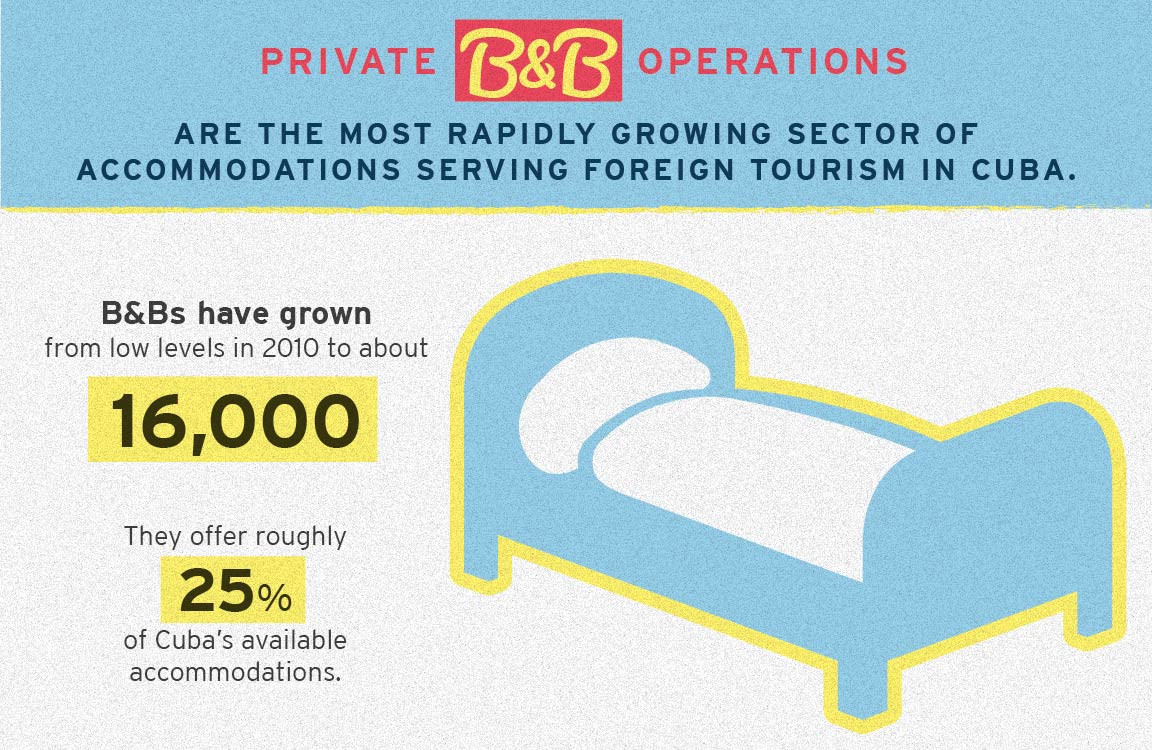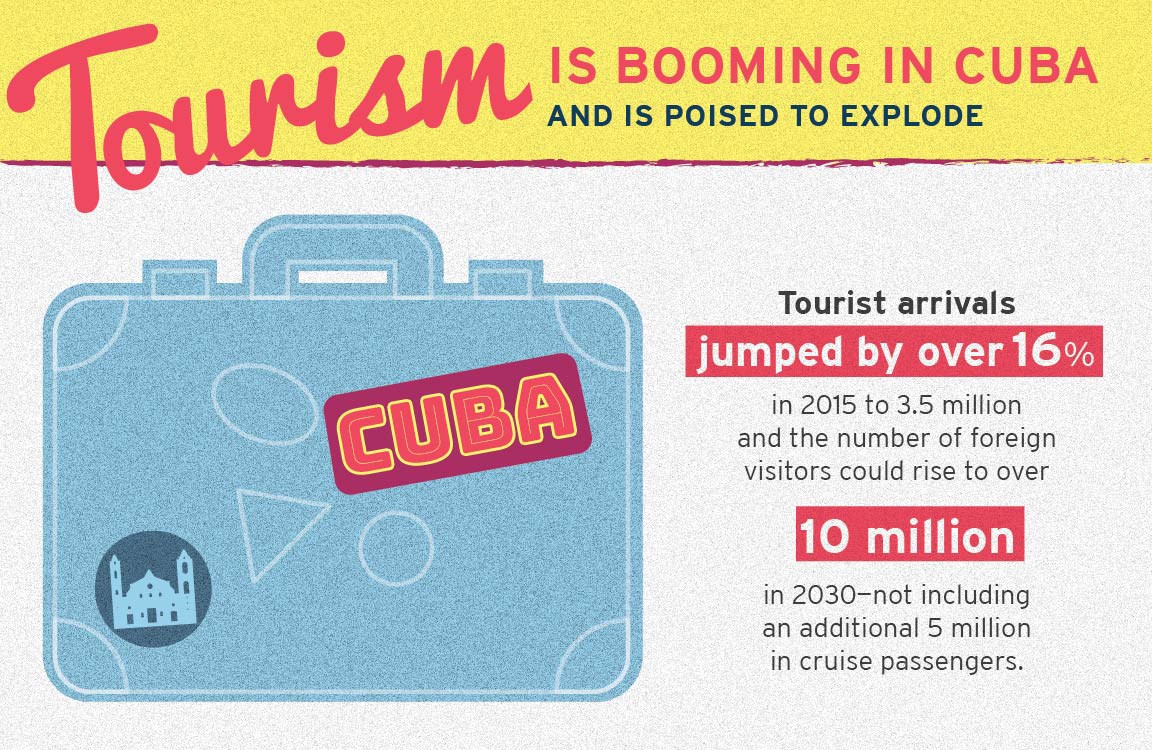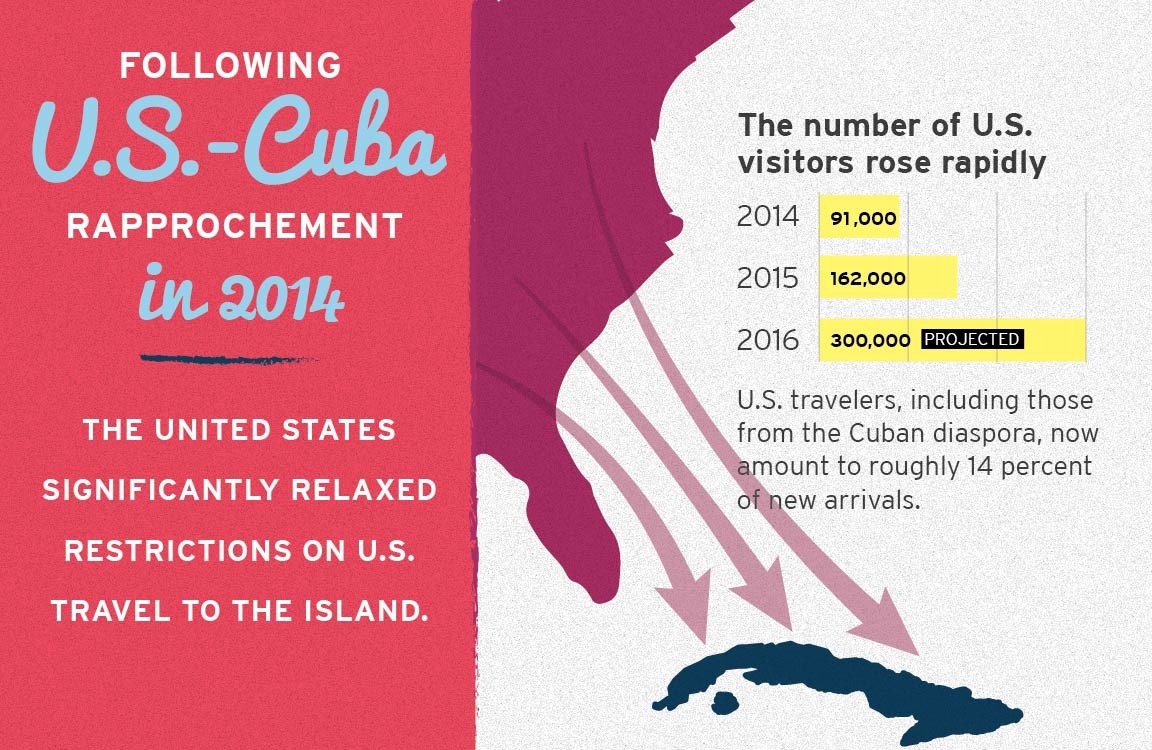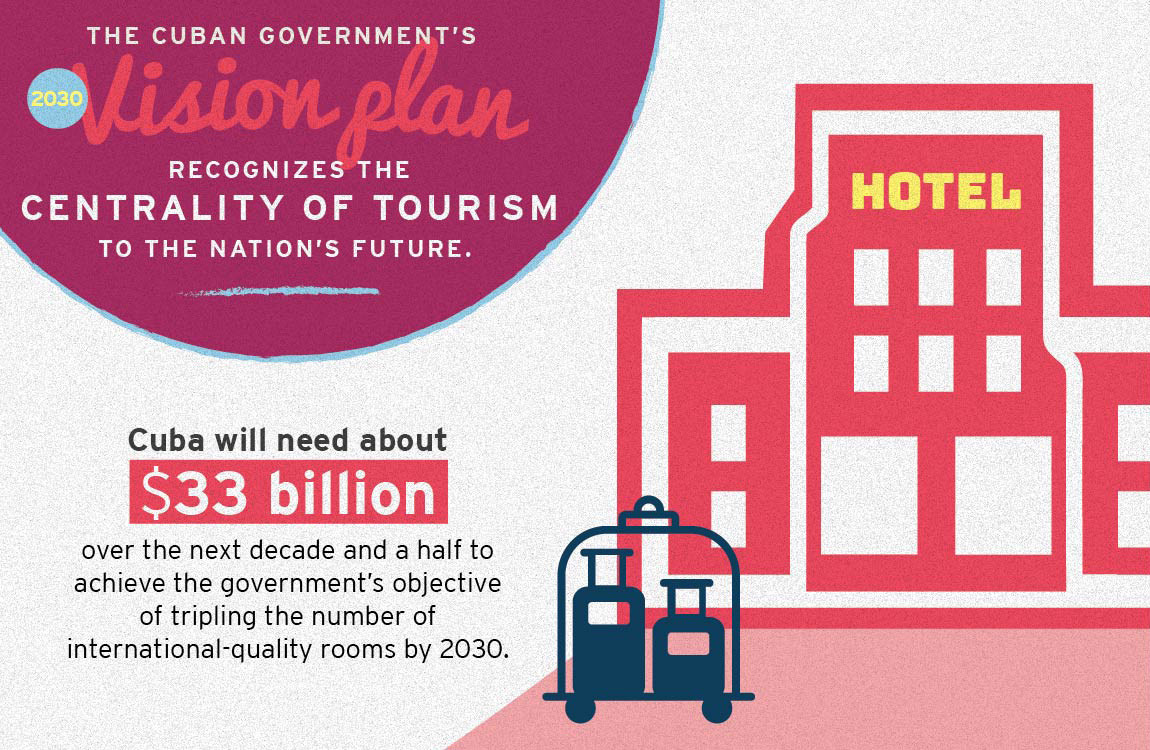Are you curious about Who Benefits From Cuba Tourism? SIXT.VN offers expert insights into this fascinating topic, providing a comprehensive analysis of the beneficiaries of the island’s thriving tourism industry. Discover how tourism shapes Cuba’s economy and society, and learn about the various stakeholders who profit from this sector.
1. What Role Does Tourism Play in Cuba’s Economy?
Tourism is a significant pillar of the Cuban economy, playing a multifaceted role in its development. It acts as a crucial source of foreign exchange, which is essential for Cuba to import goods and services it cannot produce domestically. According to the Cuban government, tourism contributes significantly to the country’s GDP.
Tourism not only injects foreign currency into the economy but also stimulates job creation across various sectors, from hospitality and transportation to agriculture and crafts. It fosters entrepreneurship by encouraging the growth of private businesses like casas particulares (private homestays) and restaurants, which cater to tourists. These businesses, in turn, contribute to the local economy by purchasing goods and services, thus creating a multiplier effect.
Beyond the economic benefits, tourism also indirectly aids in infrastructure development. To cater to tourists, investments are made in improving roads, airports, and other facilities, which benefit locals as well. Moreover, tourism can also promote cultural preservation by creating an incentive to maintain historical sites and cultural traditions, making them attractive to visitors.
2. Who Are the Major Players in Cuba’s Tourism Sector?
Cuba’s tourism sector features a blend of state-owned enterprises and private businesses, each playing a distinct role. State-owned enterprises, such as Gaviota (linked to the military), dominate the hotel industry, controlling a significant portion of the available rooms. These entities often operate in collaboration with foreign companies under management contracts, allowing them to leverage international expertise.
The private sector is rapidly expanding, particularly in the casas particulares and paladares (private restaurants) segments. These private businesses are largely Cuban-owned and operated, providing tourists with more authentic and personalized experiences. According to a report by Brookings, private casas particulares now offer nearly one-quarter of available rooms, demonstrating the growing significance of private enterprise in the tourism industry.
 Private B and B operations are the most rapidly growing sector of accommodations serving foreign tourism in Cuba
Private B and B operations are the most rapidly growing sector of accommodations serving foreign tourism in Cuba
Foreign investors also play a role, primarily through joint ventures with state-owned entities. These partnerships bring in much-needed capital and expertise, helping to improve the quality and variety of tourism offerings.
SIXT.VN understands the importance of connecting travelers with reliable and high-quality services. We provide options for airport transfers, hotel bookings, and guided tours to ensure a smooth and enjoyable travel experience in Cuba. Contact us at Hotline/Whatsapp: +84 986 244 358 or visit our website, SIXT.VN, to learn more.
3. How Do Local Communities Benefit From Tourism in Cuba?
Tourism provides numerous economic opportunities for local communities in Cuba. It creates jobs in hotels, restaurants, transportation, and other tourism-related businesses. These jobs offer a source of income for many Cubans, improving their standard of living.
Small-scale entrepreneurs also benefit significantly. The rise of casas particulares and paladares allows Cubans to operate their own businesses, earning income directly from tourists. These businesses often source goods and services locally, further contributing to the community’s economic well-being. According to research, these private enterprises constitute a dynamic cluster that now amounts to about 30 percent of the tourism industry.
 Tourism is booming in Cuba and is poised to explode
Tourism is booming in Cuba and is poised to explode
Tourism can also lead to improvements in local infrastructure. As tourist destinations become more popular, local governments often invest in upgrading roads, utilities, and other public services, benefiting both tourists and residents.
SIXT.VN is committed to supporting local communities by promoting sustainable tourism practices. We partner with local businesses and encourage travelers to engage with the community respectfully, ensuring that tourism benefits everyone involved.
4. What Impact Does Tourism Have on Cuba’s Culture and Heritage?
Tourism has a dual impact on Cuba’s culture and heritage. On one hand, it can contribute to the preservation and promotion of cultural traditions. The demand from tourists to experience authentic Cuban culture encourages the maintenance of historical sites, music, dance, and other cultural expressions. For example, the revenue generated from tourism helps fund the restoration of UNESCO World Heritage sites in Havana and other cities.
However, tourism can also lead to the commodification of culture, where traditions are altered or staged to cater to tourist expectations. This can result in a loss of authenticity and cultural integrity. It is crucial to strike a balance between promoting culture for tourism and preserving its true essence.
SIXT.VN encourages responsible tourism that respects and supports local culture. We offer tours that provide authentic cultural experiences while minimizing negative impacts.
5. How Does the Cuban Government Manage Tourism Revenue?
The Cuban government plays a central role in managing tourism revenue. A significant portion of the revenue generated by state-owned tourism enterprises goes to the government, which then allocates it to various sectors of the economy, including healthcare, education, and infrastructure.
The government also uses tourism revenue to subsidize certain goods and services, ensuring that they remain affordable for Cuban citizens. Additionally, it invests in tourism infrastructure, such as building new hotels and improving existing facilities, to attract more visitors.
However, the management of tourism revenue is not without its challenges. There are concerns about transparency and efficiency in the allocation of funds. Some argue that a larger share of the revenue should be directed towards local communities and private businesses to further stimulate economic growth.
SIXT.VN advocates for greater transparency and accountability in the management of tourism revenue, ensuring that it benefits all stakeholders, including local communities and the environment.
6. What Are the Environmental Impacts of Tourism in Cuba?
Tourism can have significant environmental impacts in Cuba. The construction of hotels and resorts can lead to deforestation, habitat destruction, and soil erosion. Increased tourist activity can also result in pollution of beaches, rivers, and other natural resources.
The high demand for resources, such as water and energy, can strain local infrastructure and lead to environmental degradation. Additionally, the disposal of waste generated by tourists can pose a challenge, particularly in areas with limited waste management facilities.
However, tourism can also promote environmental conservation. The recognition of the economic value of natural resources can create incentives to protect them. Ecotourism initiatives, for example, can help preserve natural habitats while providing income for local communities.
SIXT.VN is committed to promoting sustainable tourism practices that minimize environmental impacts. We encourage travelers to choose eco-friendly accommodations, reduce their waste, and respect the natural environment.
7. How Has the Opening of U.S.-Cuba Relations Affected Tourism?
The thawing of U.S.-Cuba relations in 2014 had a significant impact on tourism. The easing of travel restrictions led to a surge in American visitors to the island. This influx of tourists provided a boost to the Cuban economy, particularly for private businesses.
The increased demand for tourism services also spurred investment in new hotels and other facilities. However, the Trump administration’s subsequent tightening of restrictions on U.S. travel to Cuba has dampened some of the initial enthusiasm. Despite these challenges, the long-term potential for U.S.-Cuba tourism remains significant.
 Following U.S.-Cuba rapprochement in 2014, the United States significantly relaxed restrictions on U.S. travel to the island
Following U.S.-Cuba rapprochement in 2014, the United States significantly relaxed restrictions on U.S. travel to the island
SIXT.VN closely monitors the evolving U.S.-Cuba relations and adapts its services accordingly. We provide up-to-date information on travel regulations and offer flexible booking options to accommodate any changes.
8. What Challenges Does Cuba Face in Developing Its Tourism Industry?
Cuba faces several challenges in developing its tourism industry sustainably. One of the main challenges is the limited infrastructure, including outdated hotels, inadequate transportation, and unreliable internet access.
Another challenge is the lack of investment in human capital. There is a need for more training and education in the tourism sector to improve service quality and professionalism. Additionally, Cuba’s complex bureaucracy and regulatory environment can hinder private sector growth and foreign investment.
Despite these challenges, Cuba has made significant progress in recent years in developing its tourism industry. The government has implemented reforms to encourage private enterprise and attract foreign investment. With continued effort and strategic planning, Cuba can overcome these challenges and realize its full tourism potential.
SIXT.VN works closely with local partners to address these challenges and improve the quality of tourism services. We provide training and support to local businesses, helping them to meet international standards.
9. What Policies Could Promote Sustainable Tourism Growth in Cuba?
Several policies could promote sustainable tourism growth in Cuba. One key policy is to encourage greater foreign investment in the tourism sector. Streamlining the approval process for foreign investment projects and providing clearer rules and regulations would attract more capital and expertise.
Another important policy is to support the growth of private businesses. Simplifying the tax structure and reducing bureaucratic hurdles would encourage more Cubans to start their own tourism-related businesses. Additionally, the government could invest in improving infrastructure, particularly transportation and internet access.
Revamping the pricing systems governing critical inputs, together with exchange rate reforms, would open the way for deepening the employment and linkage effects of the industry. Gradually phasing in market prices in food production, while retaining state stores to serve subsidized low-income groups, would provide incentives for farmers to expand supply, substitute for imports, and increase yields.
SIXT.VN supports policies that promote sustainable tourism growth and benefit local communities. We advocate for responsible tourism practices that protect the environment and preserve Cuba’s unique culture.
10. How Can Tourists Contribute to Sustainable Tourism in Cuba?
Tourists can play a vital role in promoting sustainable tourism in Cuba. By choosing eco-friendly accommodations, such as casas particulares that prioritize sustainability, tourists can reduce their environmental impact. Supporting local businesses, such as paladares and artisan shops, helps to ensure that tourism revenue benefits local communities.
Respecting local culture and traditions is also essential. Tourists should be mindful of their behavior and dress modestly when visiting religious sites or interacting with locals. Additionally, tourists can reduce their waste by bringing reusable water bottles and shopping bags.
Finally, tourists can educate themselves about the challenges facing Cuba and support organizations that are working to promote sustainable development. By making informed choices and engaging responsibly, tourists can contribute to a more sustainable and equitable tourism industry in Cuba.
 The Cuban government
The Cuban government
SIXT.VN provides travelers with information and resources to make sustainable travel choices. We offer tips on how to reduce your environmental impact, support local communities, and respect Cuban culture.
FAQ: Your Questions About Cuba Tourism Answered
1. Is it safe to travel to Cuba?
Yes, Cuba is generally considered a safe country for tourists. However, it’s always wise to take standard safety precautions, like keeping an eye on your belongings and avoiding dimly lit areas at night.
2. What is the best time to visit Cuba?
The best time to visit Cuba is during the dry season, which runs from November to April. The weather is pleasant, with warm temperatures and low humidity.
3. Do I need a visa to travel to Cuba?
Most nationalities require a tourist visa (or tourist card) to enter Cuba. Check with the Cuban embassy or consulate in your country for specific requirements.
4. What currency is used in Cuba?
Cuba has two official currencies: the Cuban Peso (CUP) and the Cuban Convertible Peso (CUC). Tourists primarily use CUC, which is pegged to the US dollar. However, it is increasingly common to use CUP, especially in local markets and private businesses.
5. Can I use my credit card in Cuba?
Credit cards issued by U.S. banks generally do not work in Cuba. It’s best to bring cash (Euros or Canadian dollars are recommended) and exchange it for CUC or CUP upon arrival.
6. What are some must-see attractions in Cuba?
Some of the top attractions in Cuba include Old Havana, Viñales Valley, Trinidad, Varadero Beach, and Santiago de Cuba.
7. What is the internet access like in Cuba?
Internet access in Cuba is improving but still limited. Wi-Fi is available in some hotels, parks, and public areas, but it can be slow and expensive.
8. What is the food like in Cuba?
Cuban cuisine is a blend of Spanish, African, and Caribbean influences. Popular dishes include ropa vieja (shredded beef), moros y cristianos (rice and beans), and lechón asado (roast pork).
9. What should I pack for a trip to Cuba?
Pack light, breathable clothing, comfortable walking shoes, sunscreen, insect repellent, a hat, and any necessary medications. Also, bring a universal adapter for electrical outlets.
10. How can SIXT.VN help me plan my trip to Cuba?
SIXT.VN offers a range of services to help you plan your trip to Cuba, including airport transfers, hotel bookings, and guided tours. Contact us at Hotline/Whatsapp: +84 986 244 358 or visit our website, SIXT.VN, to learn more.
SIXT.VN: Your Partner for Exploring Cuba
Planning a trip to Cuba can be overwhelming, but SIXT.VN is here to help. We offer a range of services to make your travel experience smooth and enjoyable.
- Airport Transfers: Start your trip off right with our reliable and comfortable airport transfer services.
- Hotel Bookings: We offer a wide selection of hotels to suit every budget and preference.
- Guided Tours: Explore Cuba’s rich history and culture with our knowledgeable and experienced tour guides.
Don’t let the challenges of planning a trip to Cuba hold you back. Contact SIXT.VN today and let us help you create the trip of a lifetime.
Address: 260 Cau Giay, Hanoi, Vietnam
Hotline/Whatsapp: +84 986 244 358
Website: SIXT.VN
Ready to Discover Cuba?
Contact SIXT.VN today to start planning your adventure!



